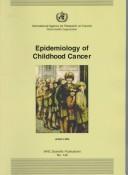| Listing 1 - 5 of 5 |
Sort by
|

ISBN: 9283221494 Year: 1999 Volume: 149 Publisher: Lyon International agency for research on cancer
Abstract | Keywords | Export | Availability | Bookmark
 Loading...
Loading...Choose an application
- Reference Manager
- EndNote
- RefWorks (Direct export to RefWorks)
Neoplasms --- Tumeurs --- Tumoren --- Tumors --- Tumours --- Child. --- Infant. --- Cancer in children --- -Childhood cancer --- Pediatric cancer --- Tumors in children --- Infants --- Children --- Minors --- epidemiology. --- Epidemiology --- Epidemiology. --- epidemiology --- etiology --- -epidemiology. --- Etiology --- Child --- Infant --- Childhood cancer

ISBN: 1280835508 0199748985 1423775643 9780199748983 9781423775645 0195146743 9786610835508 6610835500 9780195146745 0195146743 9781280835506 Year: 2004 Publisher: Oxford ; New York : Oxford University Press,
Abstract | Keywords | Export | Availability | Bookmark
 Loading...
Loading...Choose an application
- Reference Manager
- EndNote
- RefWorks (Direct export to RefWorks)
Describes the important role that epidemiologic methods play in the continuum from gene discovery to the development and application of genetic tests. It proceeds systematically from the fundamentals of genome technology and gene discovery, to epidemiologic approaches to gene characterization in the population, to the evaluation of genetic tests and their use in health services. These methodologic approaches are then illustrated with several disease-specific case studies.
Genetic disorders --- Medical genetics --- Genomics. --- Genetics, Medical --- Genetic Predisposition to Disease --- Genetic Diseases, Inborn --- Genome, Human. --- Genetic Testing --- Epidemiologic Research Design. --- Genetic Screening --- Predictive Genetic Testing --- Predictive Testing, Genetic --- Testing, Genetic Predisposition --- Genetic Predisposition Testing --- Genetic Predictive Testing --- Genetic Screenings --- Genetic Testing, Predictive --- Predisposition Testing, Genetic --- Screening, Genetic --- Screenings, Genetic --- Testing, Genetic --- Testing, Genetic Predictive --- Testing, Predictive Genetic --- Prenatal Diagnosis --- Preimplantation Diagnosis --- Cytogenetic Analysis --- Molecular Diagnostic Techniques --- Databases, Genetic --- Databases, Nucleic Acid --- Genetic Privacy --- Human Genome --- Genomes, Human --- Human Genomes --- Comparative Genomics --- Comparative Genomic --- Genomic, Comparative --- Genomics, Comparative --- Human Genome Project --- Genome --- Genome research --- Genomes --- Molecular genetics --- Clinical genetics --- Diseases --- Heredity of disease --- Human genetics --- Medical sciences --- Pathology --- Congenital diseases --- Disorders, Genetic --- Disorders, Inherited --- Genetic diseases --- Hereditary diseases --- Inherited diseases --- Design, Epidemiologic Research --- Designs, Epidemiologic Research --- Epidemiologic Research Designs --- Epidemiological Research Design --- Research Design, Epidemiologic --- Research Designs, Epidemiologic --- Design, Epidemiological Research --- Designs, Epidemiological Research --- Epidemiological Research Designs --- Research Design, Epidemiological --- Research Designs, Epidemiological --- Epidemiology. --- Methodology. --- methods. --- epidemiology. --- diagnosis --- Research --- Genetic aspects --- Genomics --- Epidemiology --- Methodology
Book
Year: 2012 Publisher: Rockville, MD : Agency for Healthcare Research and Quality,
Abstract | Keywords | Export | Availability | Bookmark
Book

ISBN: 9780195398441 Year: 2010 Publisher: New York Oxford university press
Abstract | Keywords | Export | Availability | Bookmark
 Loading...
Loading...Choose an application
- Reference Manager
- EndNote
- RefWorks (Direct export to RefWorks)
Genetic disorders --- Genomics --- Medical genetics --- Epidemiology --- Methodology
Book

ISBN: 9780198827726 Year: 2019 Publisher: Oxford : Oxford University Press,
Abstract | Keywords | Export | Availability | Bookmark
 Loading...
Loading...Choose an application
- Reference Manager
- EndNote
- RefWorks (Direct export to RefWorks)
Written primarily for 16-19 year old students, this primer aims to extend students' knowledge and inspire them to take their school-level learning further. It explores topics that are familiar from the curriculum and also introduces new ideas, giving students a first taste of the study of biology beyond school-level and demonstrating how concepts frequently encountered at school are relevant to and applied in current research. This is the ideal text to support students who are considering making the transition from studying biology at school to university. This book is a concise, stimulating introduction to plant disease, its impact on human health and economic systems, and the increasing roles of technology in surveillance, diagnosis and disease management to combat the threats of the future.Oxford Biology Primers are the only resource to introduce prospective and current students of undergraduate-level bioscience to a range of topics from this dynamic experimental science, enticing readers to study further. Its titles directly support two key transitions in the student journey : from school to undergraduate-level study, and from undergraduate to independent researcher.Its modular format offers a high degree of flexibility, with teachers being able to draw on specific volumes that augment the post-16 curriculum, university lecturers being able to draw on specific volumes at different stages of the undergraduate curriculum, and with materials from the series being available for access in both print and digital formats.
Plant diseases. --- Biosecurity. --- Plantes --- Santé. --- Maladies --- Lutte contre. --- Santé.
| Listing 1 - 5 of 5 |
Sort by
|

 Search
Search Feedback
Feedback About UniCat
About UniCat  Help
Help News
News